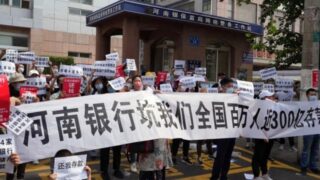China’s citizens who have encountered extremely stern and rigid coronavirus prevention measures in the country share their stories of loss and grief.
by Lu Xiu
“As governments are starting to scale-up their public health response, the threat posed by COVID-19 is reason to reaffirm, not abandon, everyone’s rights,” executive director of Human Rights Watch, Kenneth Roth, warned in mid-March. “That means prioritizing science over politics, caring for those most at risk, avoiding censorship, limiting lockdowns, and building the public trust that is essential to an effective response.”
In its report, Human Rights’ Dimensions of COVID-19 Response, Human Rights Watch calls on authorities around the world to respect the rights to freedom of expression and access to information, ensuring that lockdowns and other bans prioritize the right to health for all and comply with other universally accepted human rights. Talking about China, the report mentions that many residents encountered difficulties obtaining medical care under strict and rigid quarantine measures, illustrating the issue with chilling stories of deaths and illnesses.
Bitter Winter received more such testimonies, which demonstrate the totalitarian regime’s disregard for the lives of ordinary people.
Bureaucracy kills a baby.
On January 30, a 24-day-old baby died in a town administered by Zhangshu city in the southeastern province of Jiangxi due to delayed treatment because of the lockdown.
According to a town resident, the baby was diagnosed with acute jaundice—a liver disfunction that could be fatal for infants if not treated in time. Doctors in a local hospital suggested that the parents take the baby to a larger medical facility, with more capabilities, in the city. They rushed out immediately but were stopped at one of the coronavirus prevention roadblocks. To let them through, officials demanded to see the baby’s diagnosis from the hospital. When the parents produced it, the officials insisted on seeing a permit, issued by the committee of the village where the family resided, allowing them to leave the area. As the parents were returning with the letter, having wasted valuable hours, the baby stopped breathing.


Man dies after he is denied treatment for weeks.
In February, a woman from the northeastern province of Jilin received disturbing news: her 60-plus-year-old father, who lived in another town and was recently diagnosed with cirrhotic ascites—accumulation of fluids in the abdominal cavity—started feeling extremely unwell. The man complained to his daughter over a video call that despite his aggravated condition, he was prevented from leaving his residential community to see a doctor. In pain, unable to eat or sleep, he was confined to his home without any medical help for nearly a month.


In mid-March, when the lockdown was lifted, family members managed to finally take the ill man to a hospital, where doctors told him that his abdomen was severely infected because of the delay in treatment. He died in the hospital nine days later, after all the measures to rescue him failed.
Family prevented from seeking justice after baby dies at birth.
A woman from the northern province of Shanxi was in the final weeks of pregnancy when the coronavirus lockdown was imposed in her village. She was expecting her firstborn after years of extensive medical procedures that helped the woman to conceive. In February, as the time came to deliver the baby, she and her husband rushed to a hospital. But their journey was soon interrupted: Officials at a roadblock told them that “no one is allowed to travel for the sake of epidemic prevention.” After spending hours arguing, the couple managed to get to the hospital, but it was too late. The baby died from a lack of oxygen at birth.
The distraught couple decided to complain to the town government as well as epidemic prevention and public security departments at the county and municipal levels. They requested to see the surveillance footage from the inspection station where they were held up. However, instead of helping the grieving parents to fight injustice, the authorities destroyed the recording.
Village officials also pressured them to stop fighting the government, saying that they had no money or influence. “They told us that in case we won the case, it would mean that lockdown measures were erroneous,” the woman told Bitter Winter. “We were warned that the central government would never acknowledge doing something wrong. The officials threatened that my husband could also be detained, which would add to my grief over the lost baby.”
“The government treats common people like grass: they don’t care if we die,” the woman added. Unable to cope with her loss, she was recently diagnosed with clinical depression.









